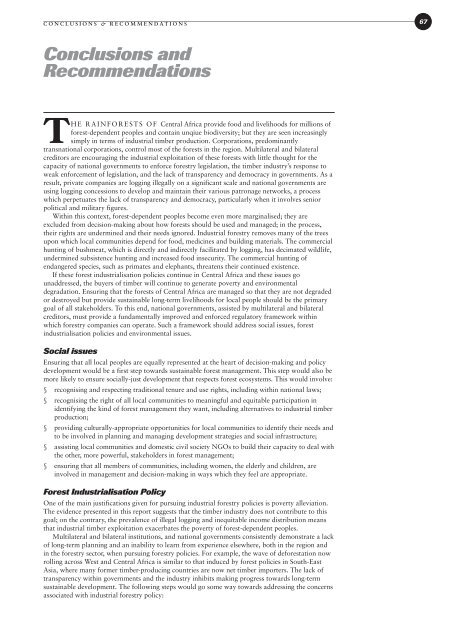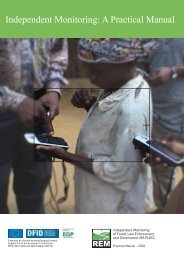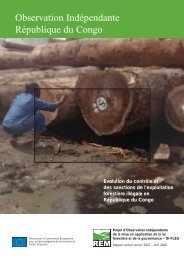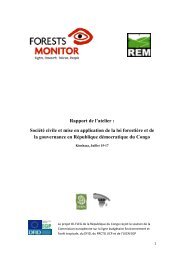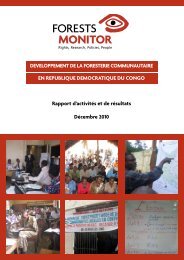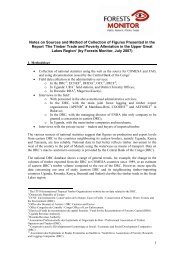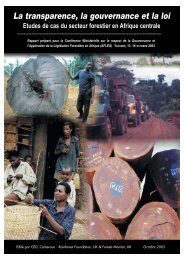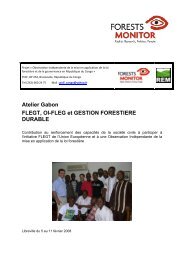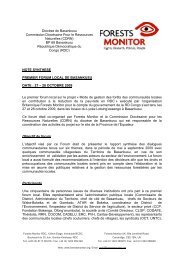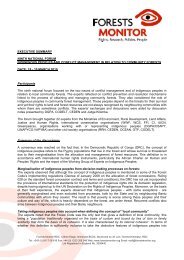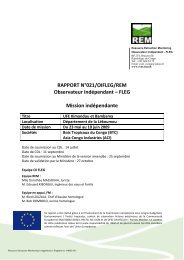66SOLD DOWN THE RIVERSEFAC (Société d’Exploitation Forestière et Agrico<strong>le</strong> duCameroun)SEFAC has a current concession in East Province (UFA 10-012) of 62,597 hectares, 323 and timber processing facilitiesin Libongo with an annual input capacity of 130,000cubic metres. 324In March 1999, WWF President, Prince Philip <strong>the</strong>Duke of Edinburgh, visited SEFAC installations andreportedly welcomed <strong>the</strong> company’s actions towardssustainab<strong>le</strong> forest management. 325 SEFAC had publicisedits contributions to local infrastructure, such as schools, aclinic and 250 kilometres of roads in <strong>the</strong> heart of <strong>the</strong>forest. 326 The company also stated that it had taken overresponsibility for <strong>the</strong> running of <strong>the</strong> police, post andcustoms service in Libongo, including paying staffsalaries. 327During this high-profi<strong>le</strong> visit, SEFAC announced a firmcommitment to preserving <strong>the</strong> forest, stating it had been in<strong>the</strong> “avant-garde of sustainab<strong>le</strong> exploitation” for 31 years,and to complying with existing forestry regulations. 328 Thecompany has been praised for its investment in high-techprocessing facilities at Libongo, and has received positivemedia attention for its investment in infrastructure for <strong>the</strong>workers and <strong>the</strong>ir families in this logging town. 329But reports from <strong>the</strong> ground suggest a more comp<strong>le</strong>xpicture with negative aspects, too. Local peop<strong>le</strong> havecomplained about <strong>the</strong> company-subsidised school, whichhas two teachers for 190 six- to seven-year olds, and <strong>the</strong>lack of scope for raising concerns about pay andconditions for fear of losing one’s job. 330 The company’sfunding of local state institutions, such as <strong>the</strong> police andcustoms service, is open to abuse and undermines anyindependence <strong>the</strong>se institutions may have had. Anunderlying concern is for <strong>the</strong> long-term viability ofLibongo, given its dependence on SEFAC’s continuedaccess to timber sources. If <strong>the</strong> company does not manage<strong>the</strong> forest sustainably and ensure a long-term supply ofquality timber, Libongo could have an uncertain future.The pattern of boom-and-bust logging towns inCameroon, such as nearby Kika, does not contribute tolong-term sustainab<strong>le</strong> development for rural peop<strong>le</strong>.Official reports from SEFAC’s concession do notal<strong>le</strong>viate <strong>the</strong>se concerns. In December 1999, a MINEFmission to <strong>the</strong> SEFAC concession (UFA 10-012) found“anarchic” and il<strong>le</strong>gal operations, including loggingoutside concession boundaries and cutting undersized logs,especially Sapelli. The mission noted that this concession,which <strong>the</strong> company has operated for more than 30 years,is of poor quality, 331 suggesting that SEFAC has exhausted<strong>the</strong> best timber, which poses prob<strong>le</strong>ms for <strong>the</strong> supply of itslarge mill.In March 2000, SEFAC was fined and its activitiessuspended for three months. 332 It was subsequentlydisqualified from <strong>the</strong> new concession allocations in July2000 for serious wrongdoing in its forestry activities. 333WIJMAWijma Kampen BV of The Ne<strong>the</strong>rlands is a family firmwhich is a subsidiary of Koninklijke Houthandel G. Wijma& Zonen BV (GWZ). 334 It has been operating for over 100years and specialises in marine hardwoods and structures,such as bridges, boardwalks and floodgates. The Dutchgovernment is a significant customer. Much of <strong>the</strong>company’s hardwood timber comes from subsidiaries inAfrica. It also has contacts in Europe, America and Asia. 335African subsidiaries are in Cameroon, Ghana and <strong>the</strong>Ivory Coast. European subsidiaries are in France,Germany, The Ne<strong>the</strong>rlands and <strong>the</strong> UK. 336CameroonWijma’s subsidiary in Cameroon is Wijma Douala SARL.It also has close links to CFK (Compagnie Forestière deKribi), although it is not known whe<strong>the</strong>r CFK is asubsidiary of <strong>the</strong> Wijma group or not. Wijma has asawmill at Kribi, with an input capacity of 50,000 cubicmetres per year, whi<strong>le</strong> CFK has a processing capacity of14,000 cubic metres per year. 337 In 1996-7, Wijmaproduced 64,314 cubic metres of logs of which 24,640cubic metres were exported. CFK produced 18,680 cubicmetres of logs and exported 5,433 cubic metres in <strong>the</strong>same period. 338 Wijma is one of <strong>the</strong> main exporters ofAzobé from Cameroon.The operations of Wijma in Cameroon have changedfundamentally over <strong>the</strong> past few years. The company usedto log directly in a number of concessions totalling208,650 hectares. According to MINEF documentation,<strong>the</strong>se have now expired and <strong>the</strong> company acts as acontractor to and purchaser of logs from o<strong>the</strong>r companies,such as COFA, a company owned by <strong>the</strong> CameroonianPresident’s nephew.In recent years, Wijma worked in partnership with <strong>the</strong>Dutch tropical forest research programme, Tropenbos. InJuly 2000, Wijma bid for a new concession but wasunsuccessful, even though it had <strong>the</strong> highest technicalscore (see Cameroon, page 15). 339 Despite <strong>the</strong>se indicationsof a commitment to improved forest management, giventhat <strong>the</strong> company no longer holds any concessions inCameroon, it is not known whe<strong>the</strong>r Wijma exerts anyinfluence over <strong>the</strong> management of concessions belongingto its suppliers or <strong>the</strong> companies to whom it acts ascontractor.A MINEF mission to <strong>the</strong> Centre and South Provinces inDecember 1999 340 reported that CFK was logging inassiette de coupe (number 10 in UFA 09-021), aconcession which belongs to COFA, without a permit todo so. The report goes on to say that Wijma managementstated that <strong>the</strong> request for <strong>the</strong> authorisation to operate in<strong>the</strong> assiette de coupe was in process at MINEF: “Thedirector of operations for <strong>the</strong> group Wijma, M. UrbaniakFrancis stated that <strong>the</strong> request for <strong>the</strong> authorisation tooperate in <strong>the</strong> assiette de coupe was in process at MINEF.However, he refused to sign <strong>the</strong> official infractions reportattached in Annexe 1.A.”WONNEMANNThe German company Gerhard Wonnemann GmbH wasfounded in 1948 and is one of <strong>the</strong> largest operators inCongo (Brazzavil<strong>le</strong>), where it operates in <strong>the</strong> south of <strong>the</strong>country as SOCOBOIS. 341, 342 The German developmentagency, DEG, was reported to own 30% of SOCOBOIS in1993, 343 but recent correspondence with DEG states thatthis is no longer <strong>the</strong> case. 344 SOCOBOIS has beenoperating in Congo since 1964 but ceased operations in1999 when seven foreign employees were kidnapped andlater re<strong>le</strong>ased by <strong>the</strong> militia. 345 In March 2000, governmentsources were reported as stating that SOCOBOIS wouldsoon be restarting its activities. 346
CONCLUSIONS & RECOMMENDATIONS 67Conclusions andRecommendationsTHE RAINFORESTS OF Central Africa provide food and livelihoods for millions offorest-dependent peop<strong>le</strong>s and contain unqiue biodiversity; but <strong>the</strong>y are seen increasinglysimply in terms of industrial timber production. Corporations, predominantlytransnational corporations, control most of <strong>the</strong> forests in <strong>the</strong> region. Multilateral and bilateralcreditors are encouraging <strong>the</strong> industrial exploitation of <strong>the</strong>se forests with litt<strong>le</strong> thought for <strong>the</strong>capacity of national governments to enforce forestry <strong>le</strong>gislation, <strong>the</strong> timber industry’s response toweak enforcement of <strong>le</strong>gislation, and <strong>the</strong> lack of transparency and democracy in governments. As aresult, private companies are logging il<strong>le</strong>gally on a significant sca<strong>le</strong> and national governments areusing logging concessions to develop and maintain <strong>the</strong>ir various patronage networks, a processwhich perpetuates <strong>the</strong> lack of transparency and democracy, particularly when it involves seniorpolitical and military figures.Within this context, forest-dependent peop<strong>le</strong>s become even more marginalised; <strong>the</strong>y areexcluded from decision-making about how forests should be used and managed; in <strong>the</strong> process,<strong>the</strong>ir rights are undermined and <strong>the</strong>ir needs ignored. Industrial forestry removes many of <strong>the</strong> treesupon which local communities depend for food, medicines and building materials. The commercialhunting of bushmeat, which is directly and indirectly facilitated by logging, has decimated wildlife,undermined subsistence hunting and increased food insecurity. The commercial hunting ofendangered species, such as primates and e<strong>le</strong>phants, threatens <strong>the</strong>ir continued existence.If <strong>the</strong>se forest industrialisation policies continue in Central Africa and <strong>the</strong>se issues gounaddressed, <strong>the</strong> buyers of timber will continue to generate poverty and environmentaldegradation. Ensuring that <strong>the</strong> forests of Central Africa are managed so that <strong>the</strong>y are not degradedor destroyed but provide sustainab<strong>le</strong> long-term livelihoods for local peop<strong>le</strong> should be <strong>the</strong> primarygoal of all stakeholders. To this end, national governments, assisted by multilateral and bilateralcreditors, must provide a fundamentally improved and enforced regulatory framework withinwhich forestry companies can operate. Such a framework should address social issues, forestindustrialisation policies and environmental issues.Social issuesEnsuring that all local peop<strong>le</strong>s are equally represented at <strong>the</strong> heart of decision-making and policydevelopment would be a first step towards sustainab<strong>le</strong> forest management. This step would also bemore likely to ensure socially-just development that respects forest ecosystems. This would involve:§ recognising and respecting traditional tenure and use rights, including within national laws;§ recognising <strong>the</strong> right of all local communities to meaningful and equitab<strong>le</strong> participation inidentifying <strong>the</strong> kind of forest management <strong>the</strong>y want, including alternatives to industrial timberproduction;§ providing culturally-appropriate opportunities for local communities to identify <strong>the</strong>ir needs andto be involved in planning and managing development strategies and social infrastructure;§ assisting local communities and domestic civil society NGOs to build <strong>the</strong>ir capacity to deal with<strong>the</strong> o<strong>the</strong>r, more powerful, stakeholders in forest management;§ ensuring that all members of communities, including women, <strong>the</strong> elderly and children, areinvolved in management and decision-making in ways which <strong>the</strong>y feel are appropriate.Forest Industrialisation PolicyOne of <strong>the</strong> main justifications given for pursuing industrial forestry policies is poverty al<strong>le</strong>viation.The evidence presented in this report suggests that <strong>the</strong> timber industry does not contribute to thisgoal; on <strong>the</strong> contrary, <strong>the</strong> preva<strong>le</strong>nce of il<strong>le</strong>gal logging and inequitab<strong>le</strong> income distribution meansthat industrial timber exploitation exacerbates <strong>the</strong> poverty of forest-dependent peop<strong>le</strong>s.Multilateral and bilateral institutions, and national governments consistently demonstrate a lackof long-term planning and an inability to <strong>le</strong>arn from experience elsewhere, both in <strong>the</strong> region andin <strong>the</strong> forestry sector, when pursuing forestry policies. For examp<strong>le</strong>, <strong>the</strong> wave of deforestation nowrolling across West and Central Africa is similar to that induced by forest policies in South-EastAsia, where many former timber-producing countries are now net timber importers. The lack oftransparency within governments and <strong>the</strong> industry inhibits making progress towards long-termsustainab<strong>le</strong> development. The following steps would go some way towards addressing <strong>the</strong> concernsassociated with industrial forestry policy:


